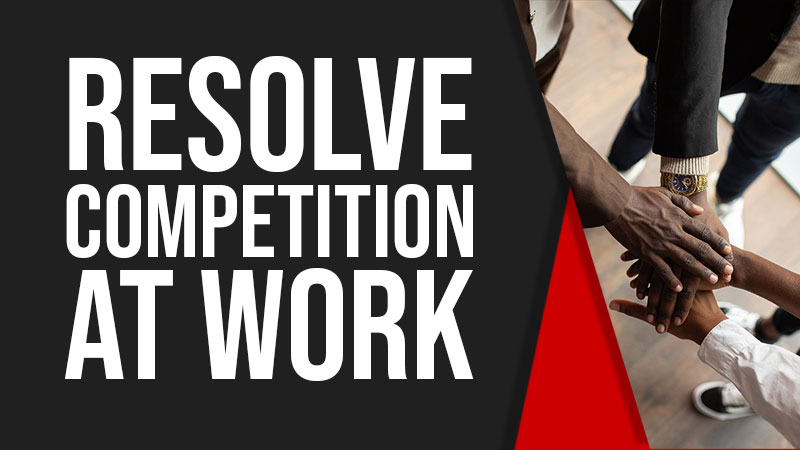The Dark Secret of Competition At Work and 5 Ways to Resolve It
Share this content :

“Iron sharpens iron, and one man sharpens another.” – Proverbs 27:17
In both finance and personal life, competition is a driving force for everyone to excel. Companies and enterprises work hard to gain recognition and gain more recognition. You challenge each other to do better when you try to reach your quota and work hours. It sounds like an effective strategy for improving professionalism and excellence.
However, you might take things too far. You might resent them or their achievements when you compare yourselves to others. They might also see you as an obstacle at work instead of a colleague. When you become too competitive, you might approach your job incorrectly. Worse, you and your colleagues might not even realize how harmful this attitude can be. Here’s what you need to know about the competition at work and how you can keep it safe and practical.
What is competition at work?
Take a look around your office space or department. Do you see a sign or board that lists how much work you and your colleagues have done this month? This board is just one example of workplace competition.
In any occupation, you’ll find several award and recognition programs that highlight you or your teammates. These programs help reward people who’ve done exceptional work, from exceeding quotas to securing high-risk deals. Different types of rewards include promotions and cash bonuses. In other words, workplace competitions acknowledge those who do well and perform within or above the standard.
Naturally, the rewards should encourage people at work to do more and be the best they can be. Under the best conditions, this mindset should kick off a competitive spirit amongst the workers. These people try to excel and achieve their best, pushing their colleagues to step up their game.
However, competition at work doesn’t need to happen because of a lovely gift. Small-time businesses may compete with their partners to test their products’ quality. Freelance writers might work hard against other authors to get their outputs recognized in public. Simply put, rewards aren’t the only reason that competition exists. It can also be for better income or dignity at your job.
How can competition at work be harmful?
Now, you might ask why competition is so dangerous. After all, you’ve just read an outline of how it can push others to excel or work harder than their peers. Remember that competition by itself is a good idea. You and your teammates would do more in the right circumstances.

However, many businesses and organizations take things too far. Suppose you and your coworkers start to obsess with the title of being the best and your attitude changes. Perfectionism is more common when you and your peers want to win. Because of competition at work, you might eventually develop four dangerous habits that cause serious professional and personal harm.
You treat yourself or others as inferior.
When you focus on who is the best at work, your treatment of others and yourself could change. You might think you are so good that others cannot be trusted. Perhaps you feel that your colleagues aren’t skilled enough to do their job correctly. You might start criticizing their work or get irritated by simple mistakes.
Conversely, you might be treating yourself too harshly. People who stay competitive and don’t get the top score or rank might question their skills. You may start to doubt your competency as a person or worker. For example, minor grammatical errors feel like giant mistakes that ruin your reputation or credibility. Even if it’s unreasonable, being too competitive at work can warp your view of your ability. You might even develop imposter syndrome, a mental condition where someone sees themselves as a fraud. Those with imposter syndrome doubt themselves so much that they can’t even accept a compliment, thinking it’s not true.
You doubt and argue with your colleagues.
Focusing too much on the competition at work can destroy your bond with your teammates. You might push their ideas aside or constantly criticize their work. You might also suffer nagging or contempt from your colleagues. No matter which side starts it, the team inevitably breaks down. You start doubting your peers and avoid working with them at all. What’s worse is that even if one person excels, the rest of the team might treat them harshly or exclude them. In other words, being too competitive can cause a divide between coworkers. Worse, it could even affect the rest of the team and make the atmosphere awkward and hostile.
You start to worry and panic about your performance.
You’ll obsess with your performance when you get too competitive. How you do a specific task or goal suddenly feels like defusing a bomb. You focus too much on being precise with every detail in your plan. While being thorough is fine, you might get too bogged down in the little things.
For example, inexperienced writers might fill out a few chapters of a manuscript before they start editing their work. They haven’t even finished their book, but they’re already trying to overcompensate by fixing it. Similarly, you might get stressed out as you constantly correct or revise your work.
You might also start worrying about how you walk or talk while trying to reach a quota. You might be so fixated on your outfit or appearance that any mistake feels like a death sentence. For instance, misplacing your pen makes you feel ashamed, even if it’s not your fault. In short, you become so nervous about your requirements that you become anxious at work.
You grow to hate your work.
When you add up all the previous habits together, you’ll eventually grow to hate your job. An overly competitive workplace feels more like a boxing arena than an office. You enter the ring and prepare yourself to fight for every single thing to get the win. What makes this dangerous is that your workspace shouldn’t make you feel insecure.
If you get too caught up in the competition at work, you might not feel happy whenever you’re on the job. Your problems include constant self-doubt, inability to trust your peers, and frequent overtime or overwork to compensate. Ultimately, you’ll get burned out and feel overwhelmed when it’s time to log in for the day.
Five ways you can resolve competition at work
Now that you know how destructive excessive competition can be, it’s time to learn how to fix it. Again, competition at work isn’t inherently wrong. What makes it problematic is when you and your colleagues go too far. Here are five practical solutions you can apply to keep competition healthy, stable, and productive.
1. Take time to praise and assist your teammates.
When you get overcompetitive, you’ll feel the urge to sabotage or downplay the achievements of your colleagues. The power of pride makes you want to be the best. So, when you know someone else is better, it stings. However, don’t be too prideful and treat their achievements as inferior. Instead, take time to approach them and congratulate their hard work. For all you know, they’ve been trying their best for a long time. If you establish a good rapport, you can learn from your colleagues and see how they’ve managed their jobs.

You could also take time to approach those who aren’t doing as well as you. Give constructive feedback and point out how your colleagues can better their strategies. Good competition only exists when you help others to do well, too. So, instead of trying to stay on top, challenge others to do the same. Teach them what works for you and see if they flourish. If anything, it’ll reignite that passion for excelling and test you and your skills. By building each other up, your entire team improves even if there is competition at work.
2. Take time to collaborate with other teammates.
A common flaw in unhealthy competition is that people think only one person can win. However, rewards can be shared or credited to more than one worker. If a team or a pair works together, they can split the prize and share due credit with one another. For example, if you read any research paper, you’ll find many that include three or more authors. While the first author may be the primary writer, they take time to recognize those who’ve helped in the paper.
Take this approach with you as you approach projects. Don’t be afraid to ask for help or reach out to share the responsibility with your teammates. By asking for their assistance, you’ll show them that you want to cooperate and trust them. More importantly, you can also share the workload and avoid tiring either person out. Collaborating with other teams or departments could also teach you new skills or perspectives on projects.
Collaboration with co-workers requires better communication skills, and the video below will help you improve your speaking skills.
3. Avoid any favoritism.
If you’re a team leader or someone spearheading a project, you might have a go-to person for all your tasks. The problem is that you risk the image of playing favorites with one or two people in the office. This image can pose issues amongst your team members, especially if they feel underused or underappreciated. By delegating the most important tasks to one or two individuals, you make the rest of the team feel left out.
To avoid this, take time to assess the skillset of your colleagues. Take note of what they can do well and how fast they can do it. That way, you can divide the tasks of a project evenly. If they raise questions about why you assign them a role, explain it accordingly. It’s crucial to clarify why you chose them to do such a job. If you feel they aren’t fit for the task, elaborate on your reasons. They might agree with your assessment. Alternatively, they could point out things you might have known about them before. As long as you are honest and fair to all members, cooperation should go smoothly, and competition will subside.
4. Be professional, even if others aren’t.
Excessive competition at work can lead to gossip at the workplace or unhealthy alliances amongst team members. If you’re the one they are targeting, you’d probably want to fight back. However, remember that the office place is a professional environment.
Fighting fire with fire will only damage your reputation and cause significant strife amongst the team.
If you’re the subject of gossip or slander, don’t try and talk the same way. Instead, take time to approach your superiors to address the issue. If you must, confront the one spreading the misinformation. If they misunderstood you, explain the truth and how their words are causing harm. If they intentionally sabotage you, gather your evidence and report to the boss. Don’t surrender your integrity even if someone else is being underhanded. This way, you show your colleagues through your actions and behavior the kind of person you are.
5. Take accountability for your actions.
Whenever you make a mistake or fail, you’ll probably think of blaming someone else. Perhaps you feel that the work hours, teammates, and project were not in your favor. However, to truly overcome your competitiveness, you should know when to take responsibility. There’s always a chance that you failed what you were asked. If you slipped up, admit that you were wrong. Mistakes are helpful because they teach you what to avoid or watch for in your next project.

In addition, admitting to your flaws shows that you are honest about yourself. No one likes to fail, but it takes true courage and discipline to understand that we are wrong. If you willingly admit what you failed at, you’ll show your colleagues that you want to improve. More importantly, you and your teammates will remember that no one is perfect. Having a fun competition at work is fine, but it doesn’t mean you should always be at 100%. Once you recognize that, you’ll help your team and yourself appreciate and understand the effort you put in.
In summary
In a perfect world, competition at work is beneficial to everyone involved. It can raise the productivity standard and challenge people to do better than they usually would. However, you and your teammates might be going too far. Excess or unhealthy competition can cause self-esteem problems, mistrust amongst colleagues, and ruin your passion for work.
To avoid this, you need to develop a healthy and safe environment. You’ll foster a spirit of friendship and respect that makes competition fun by taking the time to reach out and credit your colleagues. If you act professionally and stay accountable, you’ll also show them that winning isn’t everything. Ultimately, when competition at work is done right, it can be an effective way of developing one’s skills and attitude.
Share this content :
Copyright © 2023 Munif Ali. All rights reserved.

